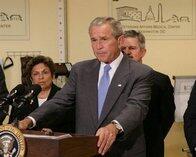What They Told Us: Reviewing Last Week’s Key Polls - Week Ending January 9, 2009
With no break in the bad economic news, Americans are reconciling themselves to the need for Big Brother to step in and lend them a hand.

With no break in the bad economic news, Americans are reconciling themselves to the need for Big Brother to step in and lend them a hand.

Sixty-five percent (65%) of New York voters approve of Gov. David Paterson’s job performance, but 48% say the state does not need to raise taxes as he has proposed to balance its budget.

Sixty-three percent (63%) of U.S. voters say it is at least somewhat likely that major legislation to improve the country will be passed during Barack Obama’s first 100 days in the White House, a strong indicator of how much voters are counting on the new administration and Congress to fix the current economic mess.

What a difference a financial meltdown makes.

If Caroline Kennedy is appointed to the U.S. Senate, she is favored to win re-election against her likeliest Republican opponent in 2010.

Just 26% of Americans think the United States will be safer at the end of Barack Obama's first year in office than it is today, according to a new Rasmussen Reports national telephone survey.

Americans are narrowly divided over whether the United States will still be the world’s most powerful nation at the end of the current century.

Nearly half of U.S. voters (48%) now think politics in Washington, D.C., will be more cooperative in the next year, according to a new Rasmussen Reports national telephone survey.

Barack Obama said repeatedly on the campaign trail that the war on terror was being fought on the wrong front, and 71% of U.S. voters say he is likely to send more troops to Afghanistan in his first year in the White House.

In the final full month of his Presidency, just 13% of American adults said they Strongly Approved of the way that George W. Bush performed his job as president. Forty-three percent (43%) Strongly Disapproved.

Forty-six percent (46%) of U.S. voters believe working Americans should be allowed to opt out of Social Security to provide for their own retirement planning, an idea not likely to gain much traction with Democrats more strongly in control of Congress.

Welcome to 2009! Last year was a rough one for all of us, but many Americans are pinning their hopes on Barack Obama, who becomes president in less than three weeks.

Over half of Americans (52%) now believe it is possible for Israel and the Palestinians to live in peace, but just 35% think Barack Obama is likely to help end the conflict during his presidency.

Americans, while far more sympathetic to Israel than the Palestinians, are closely divided over whether the Jewish state should be taking military action against militants in the Gaza Strip.

The beginning and the end of the 2008 General Election campaign were remarkably stable. Initially, after Barack Obama wrapped up the Democratic nomination, he was ahead of John McCain by four to seven points just about every night for the entire month of June. At the other end of the campaign, Obama was consistently up by about five to seven points for the last 40 days of the campaign.

With the country preparing to inaugurate Barack Obama as the next president of the United States next month, it’s hard to remember how improbable the notion of a President Obama seemed just a year ago. In fact, all indications are that Obama himself wasn’t really expecting to win it all in 2008.

It’s a showdown between the two most influential presidents of the 20th Century. Franklin D. Roosevelt versus Ronald W. Reagan.

Finally, the commercial season comes to a brief close, and the real meaning of Christmas is celebrated.

Barack Obama is just about the only bright spot on the horizon for most Americans as Christmas comes and the troubled year of 2008 nears a close.

Forty-seven percent (47%) of U.S. voters are worried that America is developing an unofficial group of “royal families” with too much influence over government and politics.